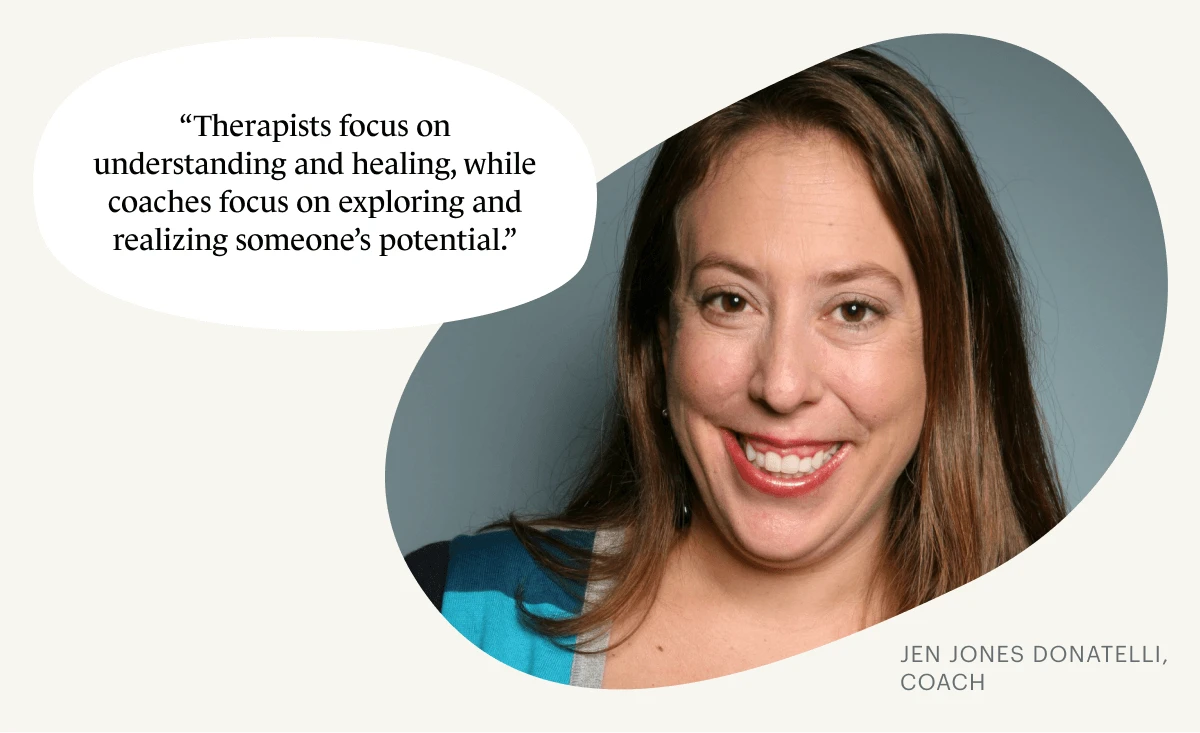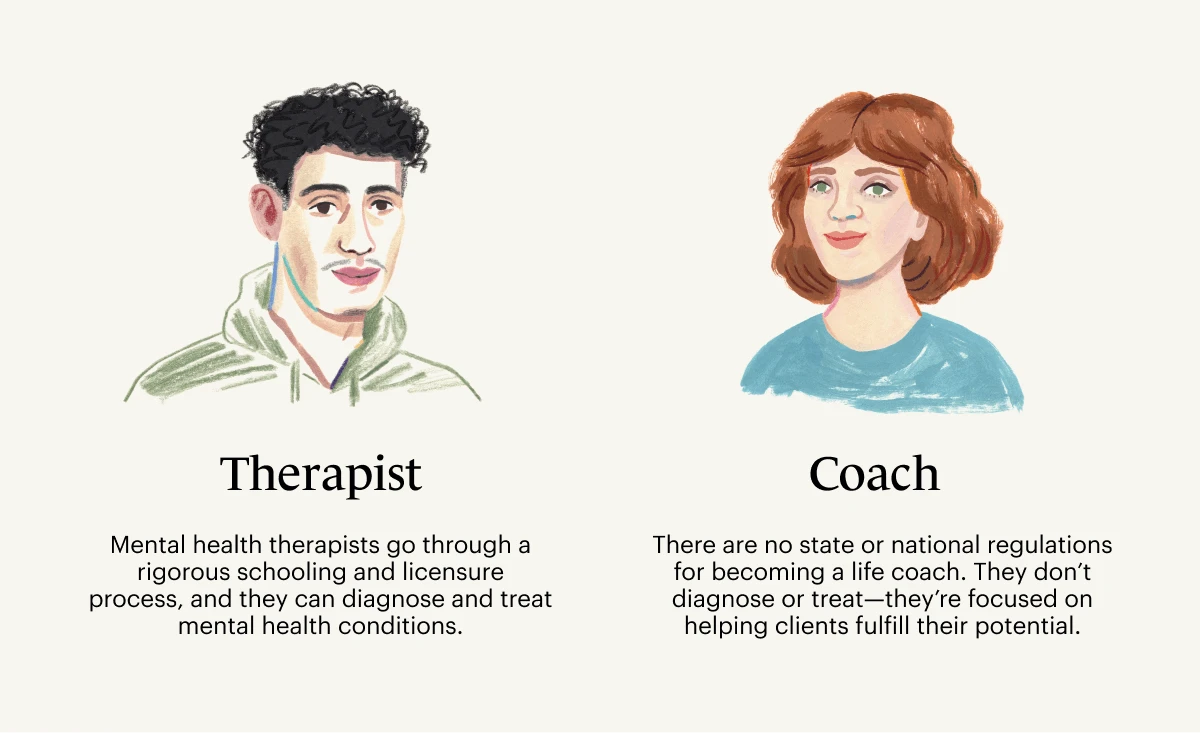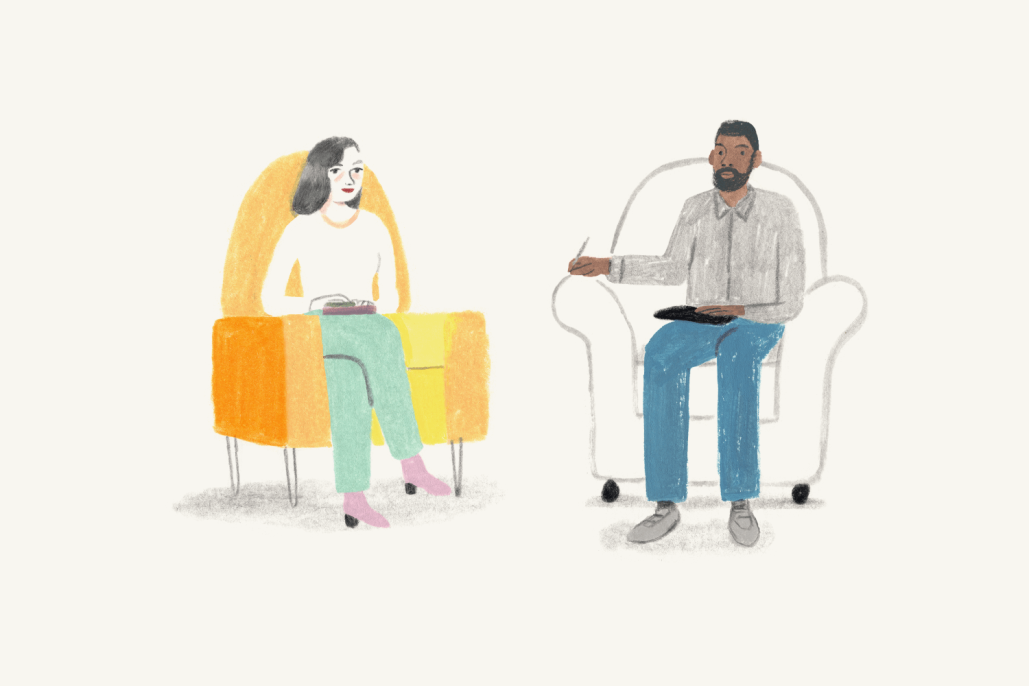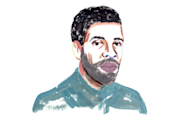Therapists and coaches can both be helpful in guiding us to live healthy, productive lives.
So, therapist or coach? Which might you need?
It’s essential to understand the differences in their credentials, modes of practice, and the specific objectives they can each help clients achieve.
Some people get the best results when they choose to see both a therapist and a coach.
What’s right for your individual needs? Let’s dive in and find out.
Therapist vs. coach—how to choose?
Some therapists consider themselves coaches. However, the majority of life coaches are not licensed therapists.
This is an important distinction, as it is against the law to practice mental health therapy without a license.
Mental health therapists are licensed to diagnose and treat mental health conditions including anxiety, depression, grief, ADHD, PTSD, and addiction.
They offer insight by helping patients to identify the roots of emotional issues and problematic thinking and can help people recover from trauma, grief, and loss.

In contrast, life coaches do not diagnose or treat—they’re focused on helping clients fulfill their potential by setting and achieving goals. Coaches might assign homework and emphasize accountability.
“Therapists and coaches are very different,” says Marie Ritz, LCSW. “Therapists are past-oriented and can help you move through trauma and negative patterns from childhood. In comparison, coaches are future-oriented. They’ll guide you toward a goal that they set with you.”
According to coach Jen Jones Donatelli, “Therapists focus on understanding and healing, while coaches focus more on exploring and realizing someone’s potential.”
Another aspect that may be different is the power dynamic in the relationship.
“Coaches and clients are essentially peers,” Donatelli says, “whereas the therapist and client relationship is more hierarchical.”
How therapists are licensed
To become a therapist, individuals must:
1. Complete their education with either a master’s or doctoral degree
2. Take an exam and apply for a provisional license
3. Complete up to 3,000 hours of in-office individual and group therapy practice hours (the number of hours varies by state) under the supervision of a licensed therapist
4. Submit to a background check
5. Take and pass a licensing exam
Therapists may have the designation LCSW, MFT, PsyD, or PhD. These letters indicate the level of education that the individual has completed.

Are life coaches and career coaches licensed?
The coaching industry is unregulated, and coaches don’t have the same rigorous licensing requirements as therapists.
A person does not need to have training or certification to call themselves a coach.
There are many types of training and certification programs for coaches. However, there are currently no existing state or national regulations to become a life coach.
Board-certified coaches do go through extensive training and pass the Board Certified Coach Exam (BCCE), complete required hours in coaching, and are accountable to an enforceable ethics code.
Coaches can also receive accreditation through the International Coach Federation (IFC), a self-regulating group of elite coaches who provide accountability to clients and the coaching profession as a whole. Considered the gold standard in coaching, this group provides training and mentorship, and has three levels of certification.
The IFC also has a code of ethics describing its principles and values.
A coach is not a replacement for a licensed mental health therapist, however coaching may also be incredibly beneficial to helping you achieve your life goals—it depends on your specific needs.

The cost of coaching vs. therapy
Insurance companies set the price of therapy based on a number of factors including the number of therapists available with respect to local population density. Therapists are able to bill insurance companies based on mental health diagnoses.
Patients are charged a copay for in-network therapists on a per-session basis. Depending on the plan, insurance may cover a percentage of the cost for patients to see an out-of-network provider.
Coaching fees, on the other hand, vary widely. Coaching can cost more, or less, than therapy.
Many coaches offer packages or programs instead of charging by the session. Coaching can be a bigger up-front expense, and coaching is not reimbursed by insurance.
How to find a therapist
Most employer-sponsored plans and all ACA plans cover mental health.
Check out the Monarch Directory by SimplePractice to find a licensed therapist near you—and even book a free consultation or first appointment online. You can also find therapists who will meet with you remotely via telehealth video calls, if you prefer that.
First, you may want to check your health insurance provider’s website to determine the details of your mental health benefit. There, you can discover information about your copays for appointments, your deductible, and other relevant details.
If you’re uninsured or your plan doesn’t cover mental health, you can find affordable sliding-scale therapists at community centers, universities, or non-profit collectives like nationwide network Open Path Collective.
On Monarch, you can find therapists who accept your insurance, and therapists you can pay out of pocket.

How to find a coach
Since coaching is more about personal goals, start your search by determining your specific objectives.
Are you interested in improving your finances? Having better relationships? Starting a new profession? Online directories can help.
“The theory of life coaching is that everyone has the answers within themselves, they just need someone to ask the right questions,” says coach Charlotte Winters.
Ask for recommendations and referrals from your network of family and friends.
When you’ve found a prospective coach’s website, read about their personal story to better understand their approach.
“Look at the coach’s story to see if that resonates with the issue at hand,” Winters advises. “A lot of coaches work from experience—go with someone who’s walked a similar path.”
Make your assessment based on your connection with the coach’s experience, and by checking if the coach is a member of the IFC or is BCEE board certified.
Is it possible to see a therapist and a coach at the same time?
Yes, many people choose to work with both a life coach or a career coach and a mental health therapist at the same time.
“Coaching and therapy work really beautifully in tandem with each other to form a really nice jigsaw puzzle for transformation,” says coach Jen Jones Donatelli
Sherrie B. agrees. “I've found both coaching and therapy helpful,” she says. “Together, they helped me to have the courage to start a new career, including starting grad school at age 54. I absolutely love my new career and it has given me the courage to make other positive changes in my life. “
Decide based on your needs
If it’s important to you to work with a licensed professional, fluent in the language of the healthcare system and trained to deal with symptoms of mental health issues such as anxiety, trauma, PTSD, grief, and depression, then you will likely want to speak with a therapist.
If you’re interested in specialized guidance and accountability around present-day goals, then coaching might be a great fit.
And some of us may even experience greater benefits and progress from deciding to work with both a therapist and a life coach or career coach.
READ NEXT: Am I Burning Out? How to Bounce Back
Looking for a therapist near you? Check out the Monarch Directory by SimplePractice to find licensed mental health therapists with availability and online booking.







